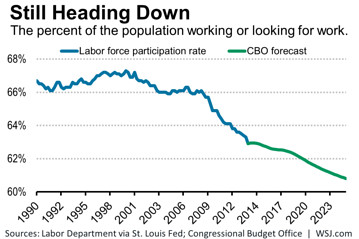Absolutely! The number of jobs is NOT static, but can rise or fall with overall health of nation's economy. Multiple examples of this within the Eurozone.
Another factor in US now seems to be workforce maldistribution. Very interesting front page article in WSJ today about more "prime working age" men not having jobs. I was struck by the multiple stories of unemployed folks apparently unwilling to relocate for a job, or even quitting a job to relocate to a more economically depressed area (e.g. quitting FT pos in FL to job seek in metro Detroit?).
More Men in Prime Working Ages Don't Have Jobs - WSJ.com
(unfortunately-pay article, but avail via many local libraries)
This is in face of latest Fed Beige Book report noting significantly improving labor demands (& housing markets) in multiple regions.
FRB: Beige Book - January 15, 2014
And here's a sample article from Midwest about specific skilled labor shortage (welders) inhibiting economic growth-
THE REGULARS: Workforce shortage requires both short-, long-term responses
Wouldn't the economy (& many families) be doing better if the skilled/educated unemployed & the available jobs got together


